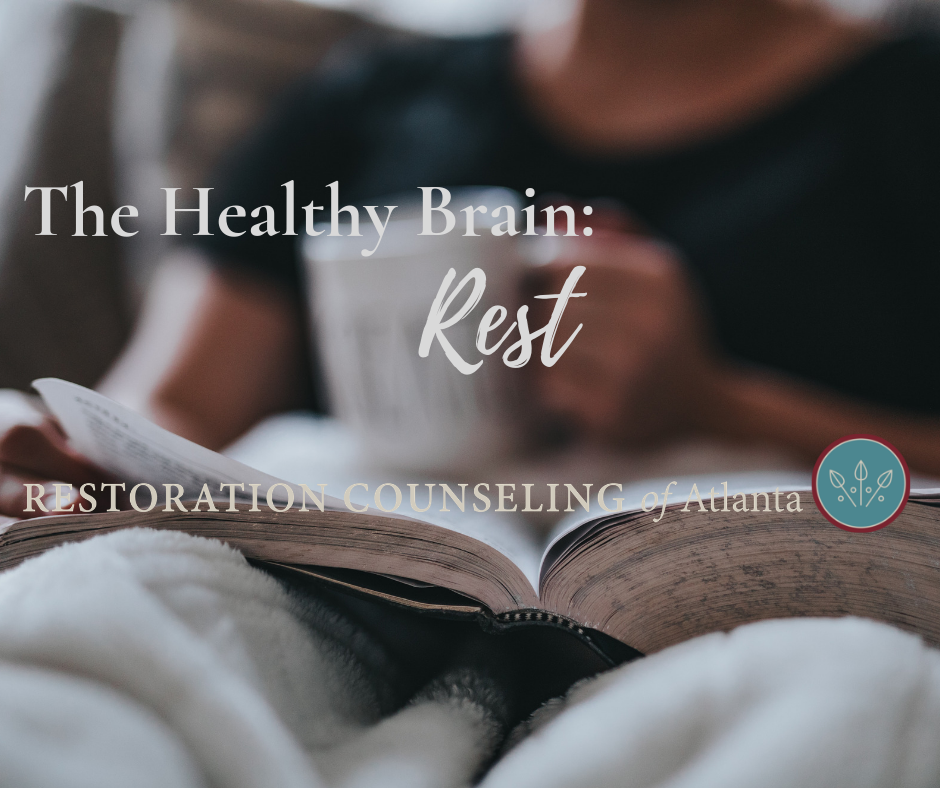The Healthy Brain and Rest
Your brain is amazing. Neurons, neurotransmitters, neural networks, electrochemical impulses, and more all work together to process, store, and share the information that you need to survive and thrive! It’s remarkable when you think about it. Your brain is affected by all you experience, and it affects all that you think and do. Still, as a culture, we think much more about how to maintain a heart-healthy lifestyle than how to take care of our brains. That’s why, throughout the year, the Restoration Report will occasionally include articles that touch on some of the basics of brain health. This month, we share a bit of the science behind how our brains benefit from rest.
The Struggle is REAL!
In today’s American culture we are bombarded with information. Opportunities for interaction and activity abound. Email, instant messages, text messages, social media, school responsibilities, work responsibilities, family joys and demands, and ministry opportunities all vie for our attention and focus. Our culture values hard work and productivity, and we have the tools to make it happen. Although many of the activities that we engage in are good, without adequate rest for our brains, they have the capacity to bombard us with information and deplete our mental resources. This can leave us with symptoms of stress and illness which paradoxically may result in decreased productivity. Science shows, what many people once thought ridiculous- brains need downtime.
Brains Need Downtime.
Although scientists have known for years that brains need adequate sleep for health and forming memories, it was long believed that during downtime, our brains were idle and unproductive. Neuroimaging studies, however, reveal that this is far from true. During times when we relax and disengage from mental focus, specialized neural resting circuits become active and connect different parts of the brain. This connection is vitally important for healthy information processing, storage, and memory formation.
For example, the default mode network, one of the most studied resting brain circuits, has been shown to be essential to mental processes that help us understand who we are, reinforce our code of ethics, and make sense of what we have recently learned. Research on the default mode network reveals that it is especially active in creative people. It explains how the mind seems to occasionally solve problems without our even thinking about them! It is responsible for those “Aha!” moments that seem to occur just when we need them the most.
“Aha!” Ancient Wisdom Also Speaks to Our Need for Rest
Although modern science is beginning to scratch the surface in providing an understanding of the biology behind the human need for rest, ancient wisdom in Judaism and Christianity has long spoken to its importance. In Genesis 2:2, Scripture tells us that the Lord rested after the sixth day of creation. In Exodus 20:8-10, the author communicates that we are to, “Remember the Sabbath day by keeping it holy. Six days you shall labor and do all your work, but the seventh day is a sabbath to the Lord your God. On it, you shall not do any work…” If the Lord Himself rested after six days of creation, and He commands us through Scripture to cease from our work on the Sabbath, surely there are important reasons to break away from our everyday activity in order to rest and experience some downtime.
Finding Downtime.
However, finding downtime in our fast-paced lives can be a challenge. How do we allow our minds to rest and maximize the benefit of resting state mental processing? Take a guilt-free break! Research shows that intentionally taking moments to disconnect from focused mental activity, following daily routines, observing the Sabbath, going on vacations, daydreaming, walking in nature, and even blinking your eyes allows your brain to experience some of the much-needed rest that is important for brain health, productivity and overall well-being.
It’s time to heed my own advice. I’m headed outside to put my feet up and daydream for a while. More to come on Brain Health in the September issue of the Restoration Report.
 Written by Andrea Brandt
Written by Andrea Brandt
Andrea graduated this past May with a Master’s Degree in Clinical Mental Health Counseling (CMHC) from Richmont Graduate University, a Christ-centered academic environment. She is now serving clients at Restoration Counseling of Atlanta and offering reduced cost counseling while pursuing her APC certification (Associate Professional Counselor).
Andrea’s education has equipped her to work with women, men, couples, and teens from various backgrounds who desire to change unwanted habits and behavior, reduce stress and depression related to daily living and past experiences, improve relationships, and enhance overall well-being. She also works with clients who are experiencing the pain of grief and loss.
References
Jabr, Ferris (2013). Why Your Brain Needs More Downtime. Scientific American. Retrieved from: https://www.scientificamerican.com/article/mental-downtime/
N.A. (2015). Know Your Brain –Default Mode Network. Neuroscientifically Challenged. Retrieved from: https://neuroscientificallychallenged.com/blog/know-your-brain- default-mode- network
Santos-Longhurst, Adrianne (2018). How to Treat and Prevent Mental Exhaustion. Healthline. Retrieved from: https://www.healthline.com/health/mental-exhaustion

